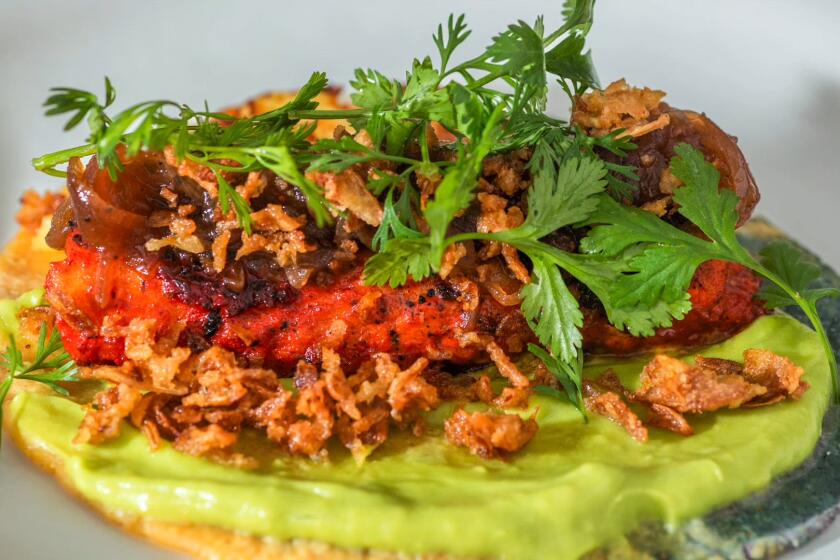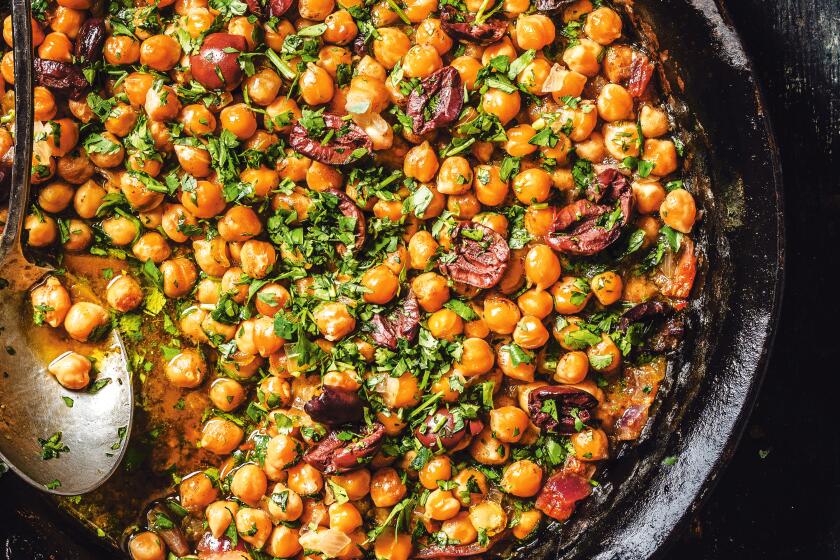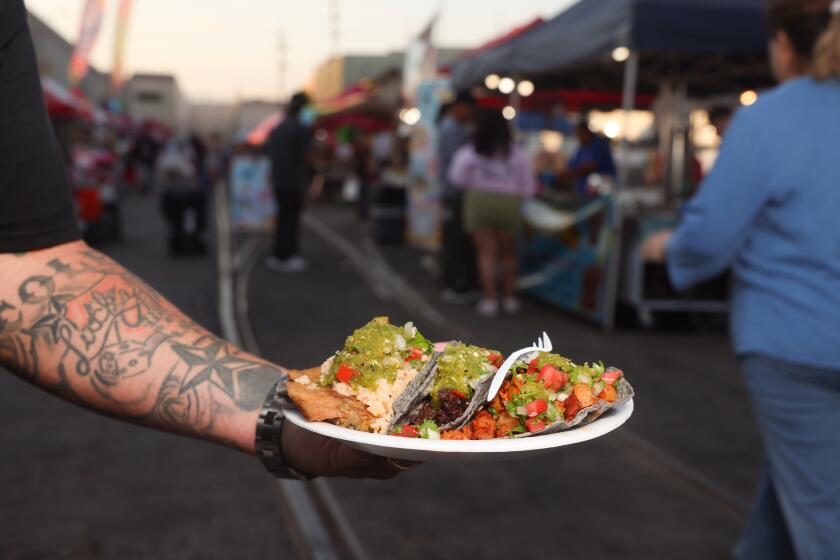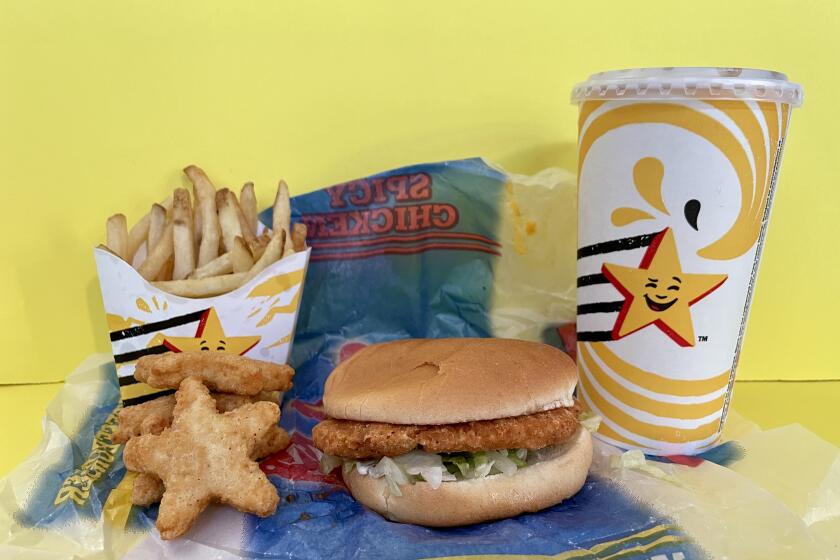THE WAITING GAME MAY BE ONLY A STATE OF MIND
Last week, in discussing the Society for American Cuisine’s “Year of the Waiter” program, I mentioned that part of the group’s suggested plan “to raise waiters’ status, both in the eyes of the restaurant industry and in the eyes of the public,” involved the encouragement of more and better training of waiters.
“All waiters suffer when a few unprofessional waiters do not take their jobs seriously,” said Bill Sarkees, who plays the waiting game himself at Frog in Philadelphia.
Sarkees is right in principle, of course, but he’s got the numbers wrong. Some waiters, in fact, suffer because a veritable multitude of waiters don’t take their jobs seriously. For whatever reason or combination of them--lack of fringe benefits and irregularity of income for waiters, the sheer physical demands of the trade, inborn American resistance to the idea of anything smacking of servitude, or whatever--being a waiter in a restaurant is rarely considered a full-time, permanent occupation in this country today. Most waiters, that is, don’t act like professionals because they’re not professionals and don’t consider themselves to be. The plain truth is that anybody with an IQ of 85 or so and the basic motor functions intact can be a waiter. Not necessarily a good waiter, mind you, but a waiter nonetheless--a person going through the motions. And going through the motions is what all too many people serving tables in restaurants are doing around here these days.
Patently non-professional waiters can, and often do, choose to do their jobs professionally anyway, simply out of pride or self-respect. There is a lot of good service in Los Angeles; there are a lot of intelligent, ambitious, hard-working waiters out there, whatever their career plans might be--and they are by no means limited to the finest restaurants. (Nor, incidentally, are the finest restaurants guaranteed to have good service.) But what about all those waiters who can’t remember who gets what when there are only two people at the table, or the ones who stand talking to their friends while you’re trying desperately to get a fork.
The problem is at least partly the restaurants’ fault, certainly, for not taking the time and trouble to train waiters properly. But the waiter’s own motivation is a much more important factor, I think. A good waiter trains himself. I’ve always liked a story told to me once by Giorgio Masini, now general manager of the Manhattan Beach Country Club, about his days as manager of the private Regency Club in Westwood. One day, one of his better busboys came to him during the breakfast service and asked when he might be allowed to graduate to waiter status. “I’ll get you a jacket and you can go on the floor right now,” Masini replied, “if you can answer one question for me: What varieties of fruit are in the assorted fruit tray today?”
The busboy was completely unprepared for the question and couldn’t answer it. “When you start paying attention to details like that without anybody asking you to,” Masini said to the man, “come ask me about being a waiter again.” What the busboy replied is not on record; what I say is “Bravo!”
SPLITSVILLE: The big restaurant news in New York these days is that noted food-service entrepreneurs Jonathan Waxman (former chef at our own Michael’s) and Melvyn Master (a well-known wine importer), whose establishments include Jams, Bud’s and Hulot’s in Manhattan and a newly opened Jams in London, have called it quits.
“All our restaurants have really been more in Jonathan’s character than mine,” Master told me last week, “and as we both matured in the restaurant business, our philosophies grew further apart.” He has long wanted to open a place of his own, he adds, “something with more old-fashioned, traditional sort of food, in the style of a San Francisco bar and grill, with a piano player, sourdough bread, great Caesar salad and so on--sort of like a cross between the Washington Square Bar and Grill and Stars, you could say.”
The parting is “ extremely amicable,” adds Master, and he will remain a shareholder in the businesses. “It’s all Jonathan’s show now,” he concludes, “but I’m still part of the family.”
Waxman echoes the above remarks and confirms that he will be running all three New York restaurants himself. The fate of the London Jams is a bit uncertain but it might be farmed out to an independent management team and run by Waxman from a distance. Another Waxman/Master New York project, a hip cowboy-bar sort of place in TriBeCa, to be called Sage Brush Canyon, is still scheduled to open in August. Waxman and Master are investors in the place, but it will be run by former Jams maitre d’ Tyson Tinsley. Plans for a Los Angeles branch of Hulot’s have been shelved.
SIDE ORDERS: The Orange, Arcadia and Cerritos branches of the aforementioned Cask ‘n Cleaver chain have introduced a nightly “Sundowner” dinner from 5 to 7 p.m. nightly--three courses with a choice of five main dishes for $6.95 per dinner. . . . Chez Melange in Redondo Beach celebrates “Garlic Week” Tuesday through next Sunday. Then, on July 28, the restaurant presents “A Night in Santa Barbara” featuring wines from Maison Deutz and the Sanford Winery.
More to Read
Eat your way across L.A.
Get our weekly Tasting Notes newsletter for reviews, news and more.
You may occasionally receive promotional content from the Los Angeles Times.










